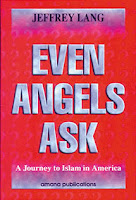I really enjoyed this book. I thought the author did a good job of presenting the history and preservation of the Qur'an from its early revelation through to the present day. But I found this book to be so much more than a telling of the Qur'an's history. I thought the author did a fantastic job of communicating the different layers of the Qur'an; from its aural beauty to its role in the everyday life of a Muslim to its impact on Muslim architecture to the rich sciences that underpin how Muslim scholars interpret the Qur'an. It's probably this depth and detail that will make this book more appealing to Muslim readers wanting to gain an appreciation of their own history than somebody outside of the faith with a passing interesting in Islam. For me though this book far exceeded my expectations and I'd go as far as putting it in my top ten books on Islam in the English language.
Below are some passages from the book which I particularly enjoyed:
"... God created a community of men and women to whom he wanted to speak, in a manner that would have universal and eternal significance for people of other times and places."
"To be awake to God, while awake to the world, is the goal of seekers of the Divine."
"The fact that much of the Qur'an was revealed to the Prophet when he was in the company of others highlights the importance of his contemporary community in the process of revelation. Although Muslims consider the Qur'an universal in its application, they have generally believed that an accurate understanding of the scripture is contingent in large part on an understanding of the historical and social context of the revelation."
"What is impossible to convey when translating these verses is the way their sound when recited accords so well with their meaning. Perhaps it is not even enough to say that the sound of the recitation is in harmony with the meaning of the words, but that the sound itself conveys meaning."
"The simplicity and accessibility of Surah al-Ikhlas accords with the Qur'anic and Prophetic message that belief in such a God is innate (fitri) and universal."
"Even when slaves were allowed to raise their own children, they were forbidden from teaching them about Islam, and they certainly could not transmit the Qur'an, orally or textually, to the next generation. As a result, the chain of the transmission of the Qur'an among perhaps thousands of African Muslims ended with their enslavement in America."
"When Abu Bakr heard that the Prophet Muhammad said that he had been taken to Jerusalem and then into the Divine Presence in the 'Night Journey', he declared, 'If he says so then it is true. And what is so surprising in that? He tells me that news comes to him from heaven to earth in an hour of a day or night and I believe him, and that is more extraordinary than that which stupefies you!'"
"How much better would it be if we stopped making declarations for a while and humbly, earnestly, tried to listen to God?"




